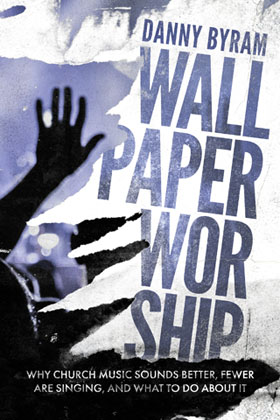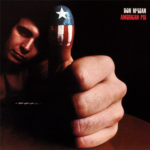
The church in America is in a cycle of prosperity. Impressive church venues are everywhere. Millions of dollars are spent to remodel sanctuaries, build new ones, purchase gear, keep up the latest trends in stage production – live video capturing – and worship song-set automation software. Yet, many who attend services find themselves standing in silence, watching screens, and observing performers on a platform. I call this lack of congregational engagement Wallpaper Worship.
In his endorsement of my book, author Philip Yancey says: “In my lifetime worship has changed from something we do before an audience of God to something a few semi-professionals do for an audience of us.”
C.S. Lewis recognized this problem over 70 years ago: “The perfect church service would be the one we were almost unaware of. Our attention would have been on God. But every novelty prevents this.”
WORSHIP LEADERS: “SOMETHING’S WRONG, BUT WE DON’T KNOW WHAT IT IS.”

In my work with worship leaders across the country, I hear from good-hearted, talented church musicians: “Something is wrong, but we don’t know what it is.”
Let’s consider… The “worship industry” is now a multi-billion-dollar segment of the music and entertainment industry. The American church market purchases over $1.5 billion a year of production gear from audio and video retailers (Music Trades magazine, February 2019). Worship song-publishing/recording companies produce new songs daily, with videos promoting a singular sound – a monochromatic look – and a homogenized form of leading from the platform.
Is this new? Technologically, yes. Historically, no.
Throughout history, expressions of worship were governed by rules which reduced congregational participation to “stare-at-the-platform-and-listen-to-us.” Priests clad in gorgeous attire with elaborate “worship gear” on sanctuary altars, would perform worship for the people. The problem? (There were many…) Leaders led in Latin which most worshipers didn’t speak or read, and congregational participation was allowed only during the Eucharist. The result? Congregants simply watched and listened. Sound familiar?
Even more concerning was when the church found itself relying on monarchies, dynasties and other secular shareholders to promote its mission. The problem? When the church becomes an industry-driven machine – opposed to a spirit-and-truth-driven organism – its message can become diluted and its mission compromised. The result? The message of human fallenness, repentance, redemption, sacrifice, suffering, and sanctification becomes eclipsed with messages of personal actualization, self-healing, and emotional relief from social, political or personal injustices. Sound familiar?
PASTORS TO WORSHIP LEADERS: “MAKE IT LOOK AND SOUND LIKE THAT!”

Leading music in today’s church, even in small rural settings, can quickly become about mimicking the latest worship-industry wave to attract more sheep. Seems like a worthy idea. However, when the worship industry needs and feeds the church, and the church needs and feeds the worship industry – resulting in passive or even frustrated congregants – then something may indeed be wrong.
Pastors or elders will view YouTube videos of arenas full of worship-music fans, with hands in the air, gathered in front of a stage occupied by music professionals – supported by world-class venue production, pristine sound, eye-candy lighting and smoke – and then dictate to their worship leaders: “Your job is to make our Sunday service look and sound like THAT.” After long hours and spent offerings, often the result is local congregants passively watching screens, silently sitting, or leaving for coffee – feeling performed at by musicians they’ve never seen before in their church.
Worship leaders ask: “What do we do now? Bigger production? More expensive effects? Newer songs? Slicker automation? What more do they want? What’s wrong with THEM?” To find relevant answers, perhaps we should ask different questions:
- Do we even believe something is wrong?
- Regarding local church worship: Does one size fit all?
- Is some corporate industry pushing the idea that ‘one size fits all?’
- If so, who and why?
I do not think there is some sinister plan by the music industry to undermine the church it profits from. However, history clearly reveals the church as vulnerable to being wooed from her mission and message, especially when there are billions of dollars involved.
So what’s the SOLUTION? As shepherds of worshipers, our job is to lead in a language our sheep understand and respond to. The Object of our worship said, “My sheep hear my voice and will not follow a hireling.” (John 10). If worshipers are not following, leaders are responsible. Good shepherds will make adjustments on behalf of their sheep (Ezekiel 34) – laying down their own preferences, agendas, and yes – even their lives.
Does one size fit all? What do you think? Please comment below.
Singer/Songwriter/Speaker/Author DANNY BYRAM has performed on over 100 US military installations worldwide since 1987. His work earned him the name “The Combat Musician” from chaplains and troops. Danny also directed 26 Promise Keepers NFL-Stadium events for men, including the Clergy Conference (the largest gathering of clergy in history), and 36 FamilyLife arena events for couples, working alongside Marantha! Music and Integrity Inc. His book: WALLPAPER WORSHIP: Why Church Music Sounds Better, Fewer Are Singing And What To Do About It is available on Amazon, Christian Book Distributors, and from CLCPublications.com. His music is downloadable through iTunes and Spotify.








Great stuff. Would love to hear more about how a worship leader at a small church can truly engage his/her congregation and lead them into true worship…without trying to be Hillsong! Thanks for the thoughts, Danny.
Kerry, I am very appreciative of your comments here. And yes, there is more to come on the “how’s” of engaging congregants! Stay tuned.
Danny Byram’s book is a must-read for anyone who attends a church. It is both insightful and constructive. Danny’s overview of the history of church worship is a perfect starting point to our understanding of where church worship stands now; both the good and also where and how there can be improvement.
Amick, thanks for the brotherly endorsement! We share a legacy of true, authentic worship.
John Piper has argued that the primary sound of worship, whether you use a pipe organ or a praise band, is the people singing. I wholeheartedly agree. Yesterday I was in a small rural church. We used either the hymnbook or looked at words on the screen while the small worship ensemble led from the back of the room. And the primary sound was the people singing. Refreshing. And decidedly NOT professional.
Bob Thanks for the comments. I’ve always said, I’m not the only one saying this stuff.
My experience has been that folks who worship in the Spirit are quick to join with those “leaders” who are doing the same – irrespective of the style of music. An invitation to join them as they worship seems to be more effective than an exhortation to somehow worship while they perform. Maybe conflating the inspiration of the Spirit with the titillation of the flesh as “worship” causes folks to seek those leaders who are the most entertaining. In my opinion, for whatever it’s worth, substance will always trump style for those who worship in Spirit and in truth.
Can’t tell you how many times I’ve heard “I want the team to look and sound like that!!” Or “we did that last year…gotta be bigger!!” Those comments can really be discouraging. On one hand, I understand that one of the best ways to learn is to imitate. But if I only train my students to regurgitate and replicate, never encouraging and allowing them to create on their own, I’ve failed as a teacher. Interesting thoughts going into the fall semester!
Suzi – Great response, especially from you who teaches “worship arts” to young undergrads. Teaching them to create, think on their own, will likely go against much of what they know now and got them enrolled in the first place. I pray for wisdom for you and others in your position – for courage to lead them to creating something new and fresh – instead of “wash, rinse, reuse, repeat.” Blessings.
I agree with Craig Conrad – I seem to perceive whether the leader is worshipping in Spirit, and respond readily if that is occurring. If whoever is leading does not seem to be “in step with The Spirit,” I will still discipline myself to worship, as My Father is seeking worshippers regardless of whether someone else inspires, but it’s much more of a challenge.
I wouldn’t say “one size fits all.” Neither would I say that a worship leader (only) can fix what’s wrong. I believe what is needed is revival- a church enlivened freshly by the Living God. When our churches are filled with people who are connected and excited about Jesus and His Gospel, His agenda, especially if the worship leaders are also stirred with affection and awe of Him, true worship will happen in spite of any lack of technology or talent.
Our God is worthy of the kind of worship and worshippers He seeks! That’s why I’m praying for revival. I don’t see another way to really “get there.”
I really appreciate your efforts to move this conversation forward!
Mollie, I remember being in a cathedral in France, hearing the worship in Latin and French. When the priest said “Agnus Dei” I recognized that as “Lamb of God.” I worshipped deeply what I understood. And big YES on revival. I join you in praying for it… soon!
Mollie- I join in praying for revival. Whatever it may look like, may it be so! And SOON!
I think that ANY form, ANY practice, ANY thing can become lifeless and rote. The reason is that our aim should not be religious practice, but relationship. As a spouse, I should not be pursuing a list of principles and practices that will make my marriage great. True and helpful principles and practices do exist, but they are not the goal – connection and oneness with my wife is the goal. In the same way, our worship should be about connection with God through physically expressing our love and awe of Him.
I don’t believe all the responsibility rests on the worship leaders. We congregants may need to be more intentional about what we’re doing. We might need to set down our cups of coffee and stir up some reverence. We might need to hear some instruction on what worship is as the Bible describes it. In general, I don’t believe a worship team can lead a congregation into worship if that congregation is not there to worship.
There is an old saying, “You can lead a church-goer to water, but you can’t make him drink.”
Scott, I absolutely agree with “we need to hear some instruction…” And I believe leaders have a greater responsibility than we want admit. If a shepherd leads a thirsty lamb to a trough of iced tea, it’s likely they don’t recognize it – and won’t drink. Good points Scott.